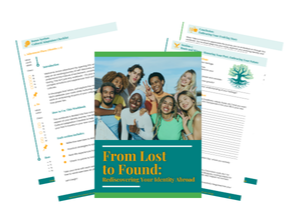From Isolation to Belonging: How I Made Friends From Scratch After Moving Abroad
Apr 27, 2025
Table of Contents
TL;DR
Moving to a new country without knowing anyone is deeply isolating, but connection is possible. Through small, brave actions, shared spaces, and intentional outreach, I built a meaningful circle that now feels like home.
Key Takeaways
-
Say yes early, even when it feels uncomfortable.
-
Find communities aligned with your true interests and identity.
-
Use online platforms intentionally as bridges, not substitutes.
-
Be proactive - initiate invitations.
-
Prioritise deep, meaningful connections over quantity.
My Story: Landing in a Parallel Universe
Moving from South Africa to Perth, Australia, felt like stepping into a parallel universe. Everything looked familiar—blue skies, beaches, shopping malls—yet nothing felt like home.
The isolation hit harder than jetlag. I’ve always valued deep connections, but suddenly, I didn't have even casual acquaintances.
If you've relocated to Australia, the UK, US, or Canada, you might recognise this feeling: the excitement fades, and the challenge of building a social circle as an adult immigrant becomes real.
The Reality of Starting Over
In that first month, I felt invisible walking through crowded shopping centres. I mourned the easy comfort of friendships built over decades.
Even simple interactions were exhausting. 'How are you going?' someone would ask as they walked past. I'd stop and reply, 'Good and you?' not understanding that in Australia, this was often just a passing greeting requiring no response. They'd keep walking, leaving me standing there awkwardly mid-sentence, wondering what I'd done wrong.
Anxiety, cultural gaps, and introversion made me want to withdraw. But isolation took a heavy toll on my mental health.
Something had to change.
Friendship Breakthrough Strategies
1. Saying Yes, Even When It Was Awkward
Three months after arriving, I said yes to a mother's group. It was awkward at first, standing at the edge of the circle while others chatted easily. But by the end, I exchanged numbers with another mum who invited me to a playdate the following week.
Each "yes" built social momentum.
Lesson: Confidence comes later. Courage comes first.
2. Finding Groups That Matched My Identity
Instead of blending into newcomer groups, I sought spaces that matched my passions:
- A tennis club where physical activity created natural conversation
- A church where shared values provided a community
- The local library, where I became a volunteer storytime reader
Lesson: Shared interests create natural bonds beyond nationality.
3. Using Digital Tools with Purpose
Rather than endless scrolling, I used technology strategically:
-
Joined local Facebook groups.
-
Used Meetup.com for events aligned with my passions.
-
Met some interesting people, usually other migrants through Bumble BFF
While digital platforms were crucial for making initial connections, I found that setting a personal rule helped me maintain balance. After matching with someone on Bumble BFF or connecting in a Facebook group, I would suggest an in-person meetup within two weeks. This prevented endless online chatting that never translated to real friendship. I also limited my scrolling through social media from back home to specific times, which helped me stay emotionally present in my new location rather than constantly looking backward.
Lesson: Technology can build bridges, but only if used intentionally.
4. Making the First Move

Friendship wasn't going to find me, I had to find it.
-
I invited a mum for coffee
-
Organised casual dinners.
-
Suggested weekend walks.
Over time, I developed a "3-invitation rule"—I would initiate three times with a potential friend. If they never reciprocated after that, I'd redirect my energy elsewhere while staying cordial. This protected me from one-sided relationships while giving genuine connections enough space to develop.
Lesson: Adults already have full calendars. Be the one who invites.
5. Focusing on Depth Over Numbers
Rather than gathering dozens of contacts, I invested in a few meaningful friendships.
Being vulnerable, sharing my struggles and culture, turned polite chitchat into real connection.
Lesson: Authenticity attracts the right people.
Invisible Barriers I Had to Overcome
Microjudgments and Stereotypes:
-
I encountered assumptions about my South African background.
-
Some jokes and comments stung.
I learned to educate lightly, choose inclusive spaces, and protect my energy.
Introversion Challenges:
-
I scheduled recharge time before and after social events.
-
I started conversations on topics I cared about.
Anxiety:
-
I reminded myself that most people think about themselves, not about judging me.
-
Structured activities helped ease the pressure.
Fun Fact: The Science of Friendship in Adulthood
Research shows it takes around 200 hours to transition from acquaintance to close friend. If it feels slow, that's normal—and worth it.
Expert Insight: Why Immigrant Networks Take Time
Dr. Antoinette Grosse explains that moving strips away "social capital." Rebuilding relationships takes time, intentionality, and emotional courage. You’re not failing, you’re starting from zero.
FAQ
How long does it typically take to build meaningful friendships?
Expect 1–2 years. The first six months are often the hardest.
Should I wait until my English improves before making friends?
No! Friendships grow through shared moments, not perfect language.
I feel like I'm always initiating—is that normal?
Yes. As a newcomer, initiation falls on you at first. Remember that many locals don't understand what it's like to build a social circle from scratch, so their lack of initiation isn't necessarily disinterest.
How do I handle homesickness while building a new circle?
Homesickness and building new connections aren't mutually exclusive. I found it helpful to designate specific times for connecting with home (Sunday video calls with family, for example) while deliberately keeping other days open for local activities. Creating hybrid traditions also helped; hosting a braai (South African barbecue) for my new Australian friends allowed me to share my culture while building new memories. When homesickness hit hardest, I'd acknowledge it rather than push it away, then channel that energy into one small action toward local connection. Remember that integrating your new and old worlds is a strength, not a weakness.
What's the biggest mistake immigrants make in building friendships?
Expecting friendships to form like they did back home. Adult friendships, especially cross-culturally, require more effort.
Navigating Home Connections
An unexpected aspect of building new friendships was navigating relationships back home. Some friends in South Africa seemed to think I'd replaced them and pulled away. I learned to be gentle but honest, explaining that I wasn't moving on from them but needed to invest in local connections for my wellbeing. Even from afar, the friends who supported my journey often became even closer despite the distance, while some relationships naturally evolved into more occasional connections. This reshuffling of your social universe is normal and necessary, though rarely discussed in the immigrant experience.
Final Thoughts: Community Is Built, Not Found
Three years after landing in Perth, I had a community. This has evolved again as life circumstances changed, but the skills I learned in those early days of connection-building have served me well through each transition.
Belonging wasn’t something I found. It’s something I created.
You can, too.
Keep showing up. Keep reaching out. Keep trusting that your people are out there.
If you're navigating the emotional journey of connection, confidence, and rebuilding your identity abroad, let's explore it together.
Book your free 30-minute connection call → www.hayleysheppard.com/contactdetails
Ready to thrive in your new country? Join my exclusive program and secure your spot to unlock a life where your unique identity flourishes. Limited spots available. Don’t miss out on this holistic journey to success.
Stay connected with news and updates!
Join our mailing list to receive the latest news and updates from our team.
Don't worry, your information will not be shared.
We hate SPAM. We will never sell your information, for any reason.




